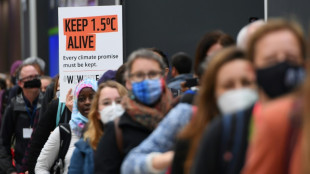
-
 Iraq's famed 'hunchback' of Mosul rebuilt brick by brick
Iraq's famed 'hunchback' of Mosul rebuilt brick by brick
-
Stock markets stutter as traders weigh China-US trade flare-up

-
 Hamas rejects Trump proposal to take over Gaza, move Palestinians
Hamas rejects Trump proposal to take over Gaza, move Palestinians
-
MotoGP champion Martin taken to hospital after Malaysia crash

-
 YouTubers causing monkeys to attack tourists at Cambodia's Angkor Wat
YouTubers causing monkeys to attack tourists at Cambodia's Angkor Wat
-
Sweden reels from worst mass shooting in its history

-
 India's Modi takes ritual dip at Hindu mega-festival
India's Modi takes ritual dip at Hindu mega-festival
-
Nissan shares fall as reports say Honda merger talks off

-
 US Postal Service says suspending parcels from China
US Postal Service says suspending parcels from China
-
Toyota announces Lexus EV plant in Shanghai

-
 Santander reports record profit for third straight year
Santander reports record profit for third straight year
-
No new clothes: S. Korean climate activist targets hyperconsumption

-
 Cummins 'hugely unlikely' for Australia's Champions Trophy bid
Cummins 'hugely unlikely' for Australia's Champions Trophy bid
-
Nissan shares plunge as report says Honda merger talks off

-
 China holds out hope last-minute deal can avert US trade war
China holds out hope last-minute deal can avert US trade war
-
LeBron relishing 'special' Doncic double act

-
 Tatum shines as Celtics down Cavs, Lakers thrash Clippers
Tatum shines as Celtics down Cavs, Lakers thrash Clippers
-
Myanmar junta bid to sell Suu Kyi mansion flops for third time

-
 Australia bans DeepSeek AI program on government devices
Australia bans DeepSeek AI program on government devices
-
Olympics on horizon as China hosts Asian Winter Games

-
 Tatum, White shine as Celtics down Cavs
Tatum, White shine as Celtics down Cavs
-
Google pledge against using AI for weapons vanishes

-
 African football has the platform for historic World Cup success
African football has the platform for historic World Cup success
-
France prop Gros happy to go 'under radar' for Dupont's benefit

-
 Bove's future uncertain after heart attack horror as Fiorentina finish Inter clash
Bove's future uncertain after heart attack horror as Fiorentina finish Inter clash
-
Race against time to complete contested Milan-Cortina bobsleigh track

-
 Speed queen Goggia pursuing Olympic dreams with 2026 Winter Games on horizon
Speed queen Goggia pursuing Olympic dreams with 2026 Winter Games on horizon
-
Asian markets stutter as traders weigh China-US trade flare-up

-
 French PM set to survive no confidence vote
French PM set to survive no confidence vote
-
Trump says US will take over Gaza, create 'Riviera of the Middle East'

-
 Google shares slide on spending plans despite sales jump
Google shares slide on spending plans despite sales jump
-
Honda shares jump on reports it wants Nissan as subsidiary

-
 Trump says US will 'take over' Gaza as he welcomes Netanyahu
Trump says US will 'take over' Gaza as he welcomes Netanyahu
-
Cold Nuclear Fusion Ready for Industry

-
 Netflix drops 'Emilia Perez' star Oscar bid over offensive posts: reports
Netflix drops 'Emilia Perez' star Oscar bid over offensive posts: reports
-
Sirianni embraces emotions ahead of Chiefs rematch

-
 Top climate scientist declares 2C climate goal 'dead'
Top climate scientist declares 2C climate goal 'dead'
-
US Treasury says Musk team has 'read-only' access to payments data

-
 Leaders 'should respect' wishes of Palestinians to stay in Gaza: Palestinian UN envoy
Leaders 'should respect' wishes of Palestinians to stay in Gaza: Palestinian UN envoy
-
Paris Saint-Germain, Brest, Dunkerque advance to French Cup last eight

-
 Simeone brace helps Atletico thrash Getafe, reach Copa del Rey semis
Simeone brace helps Atletico thrash Getafe, reach Copa del Rey semis
-
Trump hosts Netanyahu for pivotal Gaza ceasefire talks

-
 Atletico thrash Getafe to reach Copa del Rey semis
Atletico thrash Getafe to reach Copa del Rey semis
-
Stocks recover but tariff uncertainty lingers over market

-
 Shiffrin to sit out world team combined, dashing Vonn hopes
Shiffrin to sit out world team combined, dashing Vonn hopes
-
Mahomes avoids 'G.O.A.T' talk as history beckons

-
 Undav sends Stuttgart into German Cup final four
Undav sends Stuttgart into German Cup final four
-
Alcaraz battles through in first match since Australian Open

-
 Trump backs jailing Americans in El Salvador if has 'legal right'
Trump backs jailing Americans in El Salvador if has 'legal right'
-
What Elon Musk's Twitter tactics may bode for US government


China holds out hope last-minute deal can avert US trade war
China's new tariffs on US imports like oil, coal and cars are relatively modest in scale, suggesting that Beijing is hoping for a last-minute deal but also giving them the option to inflict more pain if needed, analysts say.
China on Tuesday fired a return salvo in its escalating trade war with the United States, slapping fresh tariffs on everything from American crude oil to agricultural machinery.
The moves hit roughly $20 billion worth of US goods per year -- roughly 12 percent of total American imports into China, according to calculations by Capital Economics.
Over a third of that is energy: according to Beijing customs data, imports of oil, coal and LNG totalled more than $7 billion last year.
Beijing has also slapped fresh export controls on rare metals and chemicals including tungsten, tellurium, bismuth, indium and molybdenum, used in everything from mining to phone screens.
China dominates global supply chains for rare metals.
The countermeasures came as a surprise to some -- analysts at UBS this week told AFP they had expected Beijing to keep its powder dry.
But they are a far cry from the 10 percent tariffs slapped on all Chinese imports by US President Donald Trump this week that will affect some $450 billion worth of goods.
"The measures are fairly modest, at least relative to US moves," Capital Economics's Julian Evans-Pritchard said.
They "have clearly been calibrated to try to send a message to the US (and domestic audiences) without inflicting too much damage," he added.
- Limited room for manoeuvre -
That restraint can in part be explained by China's reliance on many US imports for its industries and its longstanding economic woes at home, Agatha Kratz at the Rhodium Group told AFP.
"Given the current economic downturn, China cannot afford -- and does not want -- to impose excessive trade barriers," she said.
"China's economy is in a fragile state, and this limits its ability to act freely," she explained.
"Beijing cannot afford to take reckless actions, and I don't think it wants to."
Far from inflicting deep pain, analysts say Beijing's goal is to send a message to Washington: that China can and will retaliate to swingeing tariffs.
"These tariffs are structured to signal China's capacity to endure prolonged economic confrontation while forcing the US to deal with internal economic pressures," Mingzhi Jimmy Xu, an assistant professor at Peking University, to AFP.
- 'Serious damage' -
And Beijing can do "serious damage" to the United States should it decide to, Shehzad Qazi from China Beige Book told AFP.
The US remains heavily reliant on China for critical minerals needed to produce electric vehicles, their batteries and other key industrial applications.
Washington has had a flavour of this. In December, Beijing banned exports of metals gallium, antimony and germanium, key components in semiconductors.
That it had chosen not to, analysts say, suggests Beijing is keen to leave the door open to negotiations with Washington that could see the tariffs reversed.
Trump on Monday indicated a call with Chinese counterpart Xi Jinping could be imminent, hinting that a similar volte-face could be in the works.
But he later rolled back that claim, saying he was in "no rush" to speak with the Chinese leader.
Both Mexico and Canada -- hit with 25 percent tariffs over the weekend -- succeeded in securing a 30-day stay in last-minute deals with the US.
Beijing may be hoping for the same kind of agreement -- likely tied to a further commitment to crack down on the trafficking of fentanyl and the ownership of social media app TikTok.
"The Chinese tariffs do not go into effect until five days from now, a long time in Trump world," Wendy Cutler, a former US trade official, said in a note.
But "the question is whether Trump will react in the same way to such threats" from China, Alicia Garcia Herrero at Natixis told AFP.
"If he doubles down, China will have a problem."
P.M.Smith--AMWN